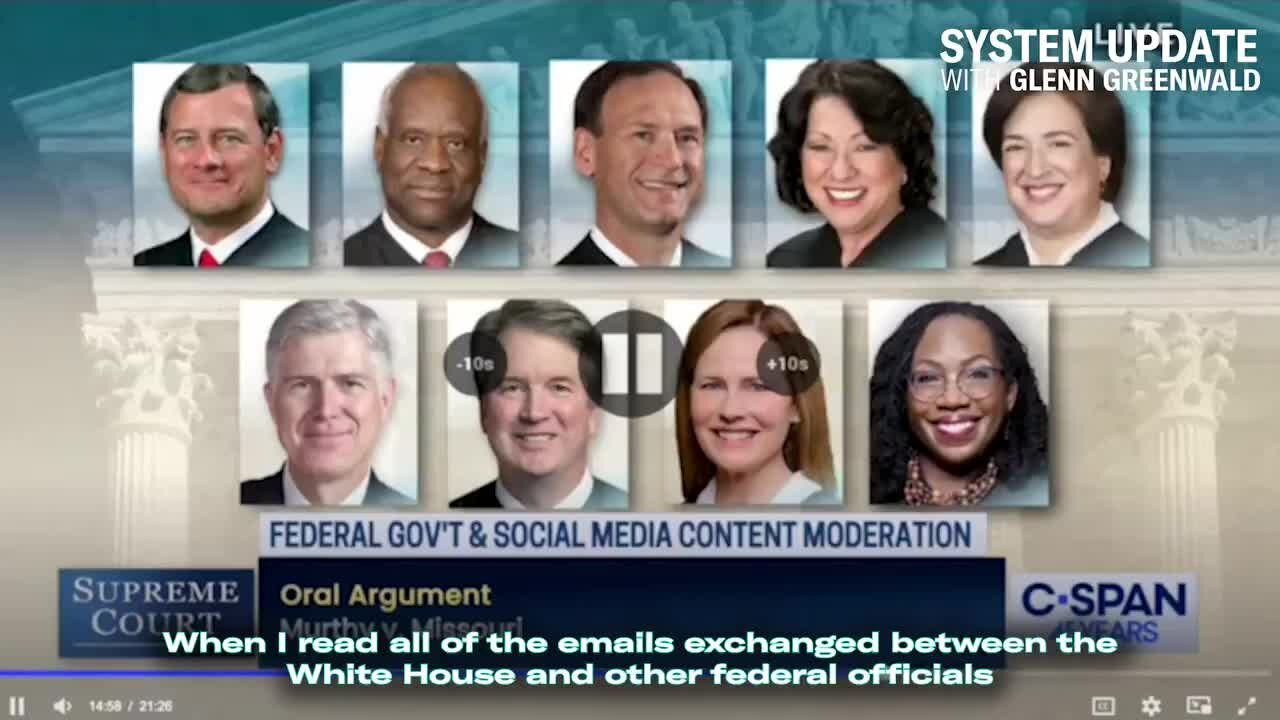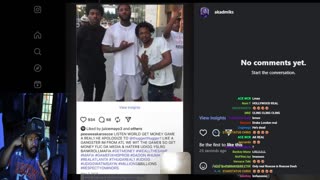Premium Only Content

Justice Alito: The Government Is Treating Social Media Platforms Like Their Subordinates, Would You Do that to the NYT?
Alito: “... exchanged between the White House and other federal officials and Facebook in particular, but also some of the other platforms. And I see that the White House and federal officials are repeatedly saying that Facebook, and the federal government should be partners. We are on the same team. Officials are demanding answers. I want an answer. I want it right away. When they’re unhappy, they — they curse them out. There are regular meetings. There is constant pestering of — of Facebook and some of the other platforms and they want to have regular meetings, and they suggest — once you — they suggest rules that should be applied, and why don’t you tell us everything that you’re going to do so we can help you and we can look it over? And I thought, wow, I cannot imagine federal officials taking that approach to the print media, our representatives over there. If you — if you did that to — to them, what do you think the reaction would be? And so I thought, you know, the only reason why this is taking place is because the federal government has got Section 230 and antitrust in its pocket. And it’s a — o mix my metaphors, it’s got these big clubs available — available to it. And so it’s treating Facebook and these other platforms like their subordinates. Would you do that to the — to ‘The New York Times, or ‘The Wall Street Journal,’ or the ‘Associated Press,’ or any other big newspaper or wire service?”
Fletcher: “So there’s a lot packed in there, I want to give you one very specific answer first, and then step back out to the broader context. So specifically, you mentioned demanding an answer right away and cursing them out. The only time that happens is in an email that’s about the president’s own Instagram account. It’s not about moderating other people content.”
Alito: “OK. We’ll put that aside. There’s all the rest. It’s constant meetings, constant emails. We want answers.”
Fletcher: “Right.”
Alito: “We’re partners. We are on the same team. Do you think that the — the print media regards themselves as being on the same team as the federal government, partners with the federal government?”
PLETCHER: “So potentially, in the context of an effort to get Americans vaccinated during a once-in-a-lifetime pandemic? And I really think that piece of context, it doesn’t change the First Amendment principles, but it’s relevant to how they apply here. And I think it’s important to understand that at this time — this was a time when thosands of Americans were still dying every week, and there was a hope that getting everyone vaccinated could stop the pandemic. And there was a concern that Americans were getting their news about the vaccine from these platforms and the platforms were promoting, not just posting but promoting bad information.” [crosstalk]
Alito: “I — I understand all that. And I know the objectives were good. But — but once again, they were also getting their news from the print media and the broadcast media and cable media. And I just can’t imagine the federal government doing that to them. But maybe I’m naive. Maybe that goes on behind the scenes. I don’t know. But it struck me as well, this is not what I understand the relationship to be. That’s all.”
Fletcher: “And I do. I think this is important, because I have the same reaction that you do, that these emails look unusual. I think the idea that there’d be back and forth between the government and the media isn’t unusual at all. When the White House press secretary on July 16 was asked about this by the press at the time, what she says is, of course, we talk to the platforms, just the way we talk to all of you when we have concerns about what you’re doing, when we have information that you might find helpful. Now, there’s an intensity of the back and forth here, and there’s an anger that I think is unusual. But the context for that, I think is that these platforms were saying publicly, we want to help. We think we have a responsibility to give people accurate information and not bad information. And we’re doing everything we can to meet that goal. That’s where this language of partnership comes from. It’s not just from the White House. It’s these platforms, which are powerful, sophisticated entities, saying we’re doing the best we can. And the anger, I think really most of the anger when you read the emails — and I appreciate that you have, because I think you have to look at them in context — the anger is when the officials think that the platforms are not being transparent about the scope of the problem, or aren’t giving the information that’s available.”
-
 1:17
1:17
Grabien
8 hours agoBakari Sellers: At the End of the Day, ‘Thoughts and Prayers’ Have Led Us to Having More of These Deaths
4 -
 2:57:09
2:57:09
TimcastIRL
5 hours agoCorporate Press Refuses To Mention Minneapolis Shooter Was Trans | Timcast IRL
170K88 -
 LIVE
LIVE
Akademiks
4 hours agoWar in RAT-LANTA. Young Thug vs Gunna vs Ralo vs YSL MONDO. Who Will Le Bebe Pick. FINAL CRASHOUT!
1,713 watching -
 1:02:24
1:02:24
Man in America
8 hours agoThe Final Battle: Nanotech, Transhumanism & the War for Your Soul w/ Dr. Ed Group
29.5K3 -
 39:56
39:56
Sarah Westall
2 hours agoUpcoming World Wide Economic Collapse/Deep Recession & What the Big Money is Doing w/ Ed Dowd
21.6K4 -
 2:52:55
2:52:55
Barry Cunningham
4 hours agoIT'S MOVIE NIGHT WITH BARRY!
34.5K23 -
 31:05
31:05
The Why Files
2 days agoPeru's Most Terrifying Mystery | The Face Peelers
40.3K41 -
 1:32
1:32
Gaming on Rumble
12 hours agoWhat is the Rumble Creator Program?!?! | Lvl UP
29.1K4 -
 1:50:49
1:50:49
Flyover Conservatives
1 day ago9/11 on Steroids: What’s Coming This Fall? - Bo Polny | FOC Show
40.6K7 -
 1:01:28
1:01:28
Precision Rifle Network
9 hours agoS4E27 Guns & Grub - Let's Talk About Gas Guns
21.8K1